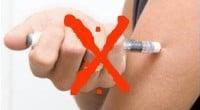
Our bodies run on the glucose energy we get from food. The pancreas makes the hormone insulin which helps the body use or store glucose.
In people with Type 1 diabetes, the pancreas no longer makes insulin. The beta cells have been destroyed. They need frequent insulin injections to use glucose from meals.
People with Type 2 diabetes make insulin, but their bodies don’t respond well to it. Most people with Type 2 diabetes take diabetes pills to help their bodies use glucose for energy.
It is estimated that today there are more than 250 million diabetics world-wide. The numbers are growing rapidly as the population ages and is likely to reach 430 million by 2030.
In the United States alone more than 30 million children and adults have diabetes – almost 10% of the population. The cost to the US economy is around US$ 200 billion per annum with more than half going to pharmaceutical companies, and most of that to “insulin delivery systems”.
Initially insulin used in diabetic treatments was derived from pigs, but the development of biosynthetic human insulin (Humulin – essentially cloned human insulin), originally developed by Genentech in 1978, changed the rules of the game.
Insulin developed into a massive industry with Novo Nordisk, GSK, Takeda, sanofi-aventis, Eli Lilly and Merck being the leaders.
But now, with the release of a new one-time treatment, an entire industry is threatened.
A discovery in 2010, at the University of Texas Southwestern Medical Center in Dallas, turned insulin from being a life saver to being totally irrelevant. The team removed glucagon receptors from mice so they couldn’t respond to insulin. Surprisingly, the mice had normal levels of blood glucose. Then, when the team used a toxin to destroy the pancreatic beta cells that make insulin, the mice remained diabetes-free.
“The bottom line is that without glucagon, you can’t get diabetes,” said a Medical Center spokesperson at the time.
Their new insights challenged the historical eminence of insulin head-on and today’s announcement of GlucaGone, a one-time treatment to nullify glucagon, effectively has obviated the need for insulin injections in an estimated 90% of diabetes sufferers world-wide.
Pharmaceutical companies have hit the proverbial brick wall in their most profitable market. A classic case of a ‘Black Swan’ that could so easily have been anticipated. As it happens, GlucaGone has not been developed by any of the top five pharmaceutical companies.
ANALYSIS >> SYNTHESIS: How this scenario came to be
By 2030, there will be over 360 million diabetics according to the World Health Organization (WHO). Half of these people don’t know they will have the disease and are in danger of suffering from many life-threatening complications.
“Like high blood pressure, diabetes may remain ‘silent’ for years without causing any symptoms whatsoever. It’s detectable only by a blood sugar test. Diabetes is serious. It almost triples your risk of heart disease, is responsible for half of all amputations and a quarter of the cases of kidney failure, and is the leading cause of blindness in many parts of the world,” said Dr. Isadore Rosenfeld of the New York Hospital.
The WHO said there were approximately 172 million diabetics in the year 2000 – almost a 50 percent increase over the 1990 figure. By 2010 the number was believed to have reached 250 million.
Type 1 or insulin-dependent diabetes mellitus (IDDM) is a life-threatening disease that begins in childhood or adolescence and is characterized by insulin deficiency. For some unknown reason, the immune system goes awry and destroys the insulin-producing cells in the pancreas, making insulin shots a necessity.
In Type 2 or non-insulin dependent diabetes mellitus (NIDDM) which often starts after the age of 40, the pancreas produces enough insulin but this is not correctly used by the body. Untreated, this also leads to death and disability.
The goal of diabetes treatment is to keep blood sugar levels as close to normal as possible. But that’s easier said than done. In the United States alone, US$ 92 billion is spent yearly on diabetes medicines. Owing to the high cost of medicines, many diabetics can’t afford to take their medicine and suffer in silence.
One way of preventing the disease is to stay active and maintain a healthy weight. You can do this with the help of Phenocal, a safe, natural, and effective weight loss supplement that boosts your metabolism, suppresses your appetite, reduces food cravings, and increases energy levels to keep you in shape.
Warning: Hazardous thinking at work
Despite appearances to the contrary, Futureworld cannot and does not predict the future. Our Mindbullets scenarios are fictitious and designed purely to explore possible futures, challenge and stimulate strategic thinking. Use these at your own risk. Any reference to actual people, entities or events is entirely allegorical. Copyright Futureworld International Limited. Reproduction or distribution permitted only with recognition of Copyright and the inclusion of this disclaimer.
